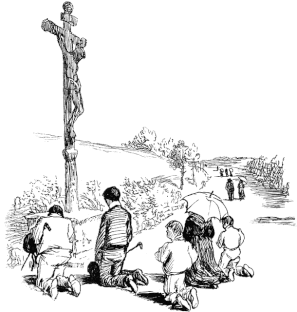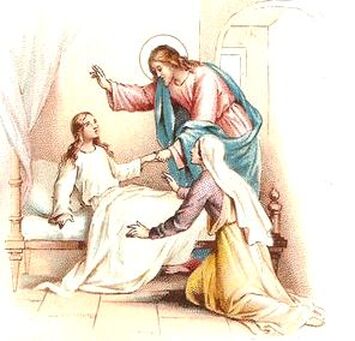
When you rise in the morning you do not know whether you will be living in the evening. Thousands have risen in the best of health in the morning, and before sunset they were corpses. This was the fate of Abel. Heli, the high priest, and his two sons died suddenly the same day. On the fifteenth of August, 1842, Father Papillon was preaching a sermon in the presence of Prince Polignac and a vast audience in the chapel of the French Embassy in London.
He was in the midst of his sermon, and said: "How precious is time, for we never know at what moment the Almighty will summon us before His tribunal, there to give an account of all our actions." These were the last words he ever uttered. No sooner had he finished this sentence than those who were present noticed his color change; they ran up to the pulpit to help him, but it was too late, the vital spark had fled and the venerable priest was a lifeless corpse. Is it not possible that you may rise in the morning, but when the evening comes you will not lie down, because during the course of the day death will have overtaken you? Since you are not secure one moment against death, is it not right that every morning when you rise you should think of death ?
St. Rose of Lima took a firm resolution to love and to serve God to the end of her life. God sent her many crosses, but she accepted them all with loving resignation to the Divine Will and bore them with heroic patience. She had also much bodily pain to suffer, but this, too, she bore from the hand of God. One day she was suffering more than usual; so great was the pain that she thought it would be impossible for her to endure it much longer. As this thought was passing through her mind she heard a sweet voice which said these words: "My dear child, My Cross was still more painful." These words consoled her and she bore her sufferings patiently to the end. She is now in Heaven enjoying the crown of happiness they gained for her.
Death enters into cities and villages at night and snatches his prey, now here now there. It was in the darkness of the night that the destroying angel came into the houses of the Egyptians and snatched away the first born. It was in the darkness of the night that the heroic Judith cut off the head of the drunken Holofernes.
Experience teaches us that more people die in the night than in the day-time. It is at any rate possible that some of us this night must make that journey on which everything depends. Consider this and never go to bed without a serious thought of death. And when you awake during the night think of your grave and say a "Hail Mary" for a happy death. Think of death in all temptations. Our life upon earth is a continuous struggle, and scarcely a day passes when we are not tempted.
Examples from Holy Scripture can show us the terrible devastations wrought. Cain, who slew his own brother Abel ; David, who loaded his conscience with a double crime; Judas Iscariot, who betrayed his Lord and Master. Whence these crimes? From temptations which were not resisted.
St. Rose of Lima, when a little girl, had very beautiful hair which hung in ringlets over her shoulders. Although she already loved God very much she was not altogether free from vanity which so often enters the hearts even of little children. One day while she was playing with her brother, he accidentally threw a quantity of mud on her hair. At this the child looked at him with a vexed countenance and was on the point of getting angry with him for what he had done to her. When he saw this and knew what was taking place in her heart, he said : "My dear sister, do not be angry at what I have done ; I did not intend to do it. But keep in mind that the devil often makes use of fine curls like these to drag good girls down to hell." Rose at once put away the anger that Had risen in her heart, and from that moment, young as she was, she took the resolution never to allow her heart to be attached to any worldly thing, that she might always persevere in the service of God.
How can we preserve ourselves from sin in all temptations? By thinking of death. How would it be possible to sin if we but said to ourselves : I must die, and I know neither how, when, nor where. This thought had been a shield to thousands, they escaped many temptations. Blessed Thomas More, the Chancellor of England, was in prison; his death on the block was certain unless he would renounce his allegiance to the Catholic Church and accommodate himself to the will of the king. His wife visited him in prison and conjured him with many tears to obey the king. Thomas looked at his wife earnestly and said: "Tell me how long shall I live if I do the will of the king and offend God ?" "O surely twenty years," was the reply. "O foolish woman," he replied, "for the sake of twenty years to die miserably and plunge myself into hell ? No, no; I would rather die than displease God. I would rather die the temporal than the eternal death." Thus spoke the great and good man. Take an example from this heroic champion.
In a hospital for sick soldiers there was a young man lying in danger of death ; he was a Catholic. Several times during his illness the priest asked him to prepare to die well, as there was but little hope of his recovery. "Not yet," he always answered. "Not yet; I will think of it tomorrow." The next day he gave the same answer, but added : "I should like very much to make my confession, but it is impossible for me to do so." "What is there that can make it impossible for you to make your confession, my boy?" said the priest The only answer the dying man gave was : "Don't speak to me of this any more, I beseech you, for I tell you it is impossible." The priest tried to show him the happiness and peace that fill the soul of a sinner who has obtained God's pardon, and asked him for God's sake to make his peace with God. The soldier shook his head. "It is of no use, Father, for you to ask me to do this. Do you see those men there? What would they think or say?" The priest at once saw that it was human respect which made the young man so stubborn, so he went to the group of visiting soldiers and said to them : "Comrades, you are making that young man die an unhappy death." "How, sir, are we doing that?" "He says," answered the priest, "that you would call him a coward and a fool if he went to confession." The men rose up in a body and went over to their dying comrade. "Do you think that we are pagans?" they exclaimed. "Instead of even thinking of calling you a coward we were quite alarmed about your refusal." These words cured the young man. He called the priest and made his confession and died an hour afterwards with a peaceful smile upon his countenance.
Children, we all have to make a long journey and like every good traveler we ought to prepare ourselves for it. And how can we be so forgetful as not to think of this journey? All persons who had the salvation of their soul at heart often thought of death. The Emperor Maximilian had his coffin made years before his death. He kept it in his room, and when he traveled he brought it with him in order by the sight of it to be reminded of death.
You see a funeral procession ; what is more natural than to think: Soon I shall be carried to the grave. You see this one or that one taking sick and dying. Ought you not to think : my turn will soon come. When you hear the clock strike, will you not think of your dying hour and say: Perhaps I shall die at the same hour that has just struck and appear before God. These frequent thoughts of death will be the means for the preservation of a good conscience, and a good conscience is like a continual feast.
My dear boys and girls, walk in the fear of God that you may obtain the greatest, most desirable and necessary of all graces—the grace of a happy death.
Source: Story Sermonettes for the Children's Mass, Imprimatur 1921



 RSS Feed
RSS Feed